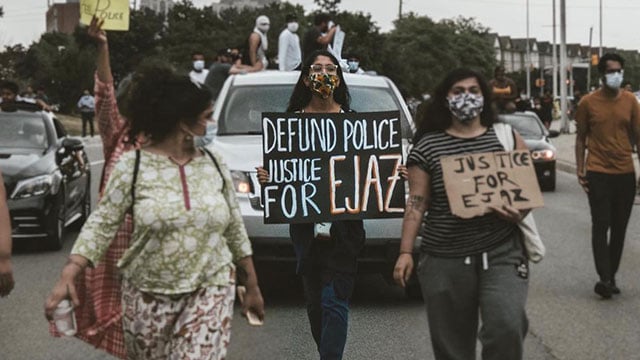Families of people killed and injured in police-involved shootings call on Brampton and Mississauga leaders for support
Published September 3, 2020 at 2:57 pm

On Sept. 2, the families of Jamal Francique, D’Andre Campbell, Ejaz Choudry, Chantelle Krupka, and Michael Headley — all people who were either killed or injured during interactions with Peel Regional Police officers in Brampton and Mississauga–attended a closed-door meeting with Mississauga Mayor Bonnie Crombie and Brampton Mayor Patrick Brown.
The meeting, held to “apply pressure on elected representatives to take action against these violations of human rights and dignity,” took place at the Malton Community Centre.
Parts of the meeting, including interviews with Krupka and Crombie, have been posted to the Malton People’s Movement Instagram page.
The Malton People’s Movement recently put out a change.org petition calling for “justice for families attacked by Peel cops, and for over-policed, underfunded communities.”
The petition comes after several police-involving shootings in Peel, including the high-profile shooting death of Ejaz Choudhry, a 62-year-old father-of-four who reportedly suffered from schizophrenia.
Choudhry was shot in his Malton apartment during a wellness check.
The group is also advocating for families affected by the deaths of Jamal Francique, a Mississauga man who was killed on Jan. 9, 2020, and D’Andre Campbell, a Brampton man killed on April 6, 2020.
The group also alleges that two Peel residents, Chantelle Krukpa, 34, and Michael Headley, were wrongfully injured during interactions with police.
Headley was tased over the course of an incident and Krupka was shot by a police officer on Mother’s Day in Mississauga.
The officer who shot and wounded Krupka after a domestic call was recently charged with criminal negligence and other offences. In a statement, the director of the provincial Special Investigations Unit (SIU), Joseph Martino, said he had reasonable grounds to charge Valerie Briffa in connection with the shooting.
Briffa has resigned from the police service.
An interview with Krupka can be seen below:
After telling reporters that she and others have been getting the run-around from leaders and watching as officers “get a slap on the wrist,” she said that advocates are here to “demand justice and demand answers.”
“We’re here to demand that the mayors take a stand,” she told reporters.
Calling the Malton neighbourhood “chronically underfunded and over-policed,” the group is calling on Crombie, Brown, MP Navdeep Bains, MPP Deepak Anand, and Ward 5 Councillor Carolyn Parrish “to use the full extent of their powers” to deliver on a series of demands.
The demands include the immediate firing of all police officers involved in the aforementioned shooting and tasing incidents, providing compensation to the affected families, ensuring all charges against survivors and Malton Blockade protestors are dropped, permanently removing police officers from all schools and defunding Peel police and reallocating the money towards community programming.
The SIU is still investigating the deaths of Campbell, Francique and Choudry, but the unit has said that an officer who was allegedly involved in the shooting death of Choudry is refusing to be interviewed.
The SIU also said that, as of July 23, the officer had not yet submitted a copy of his notes.
The SIU confirmed the subject officer is acting within his rights and that officers are not required by law to submit to interviews or turn over their notes.
Both Crombie and Brown have been vocal about the need for some police reform in the wake of Choudhry’s death, and Crombie has previously spoken out against street checks in the region.
Last month, the Peel Police Services Board (PPSB) approved a decision that will require Peel police officers to wear body cameras. That meeting was attended by Crombie and Brown, who also expressed their support for the cameras.
“I was proud to move the motion to implement body-worn cameras to increase transparency and accountability,” said Crombie, “[and to] receive an update on the roll-out of the Diversity and Inclusion Strategy, and final report on service delivery review.”
The cameras could be implemented as early as this fall, according to Deputy Chief Anthony Odoardi.
At last month’s PPSB meeting, Peel Police Chief Nishan Duraiappah acknowledged what he described as “a difficult time for members of the public, the local community, and the racialized communities that have been specifically affected,” and said members of Peel Regional Police had also been affected.
In response to high-profile incidents involving mentally-ill people and police, Peel Regional Council unanimously endorsed a motion in July 2020 calling for a community-developed plan to put more Mobile Crisis Rapid Response Teams on streets in the Region of Peel.
Mobile Crisis Rapid Response Teams, created in partnership with the Canadian Mental Health Association – Peel Dufferin, work with a specially trained Peel Regional Police officer to diffuse and de-escalate 911 calls for mental health crises.
The unanimous motion also calls for advocacy to change the Provincial Mental Health Act to allow mental health services to lead crisis responses in urgent mental health situations.
“People experiencing a mental health crisis need health care, but our system simply isn’t set up to deliver the help they need in those moments of desperation. It’s time to accelerate change,” said Regional Councillor Dipika Damerla, Vice-Chair of the Health Services committee who brought the motion to Council.
Currently, police are required to lead interventions for 911 calls for mental health crises, but many policing representatives and other experts have acknowledged that mental health should not be a policing matter.
With files from Jonah Shinuda, Lucy Mazzucco and The Canadian Press
Cover photo, taken during an earlier protest, courtesy of Malton Neighbourhood Services
INsauga's Editorial Standards and Policies


